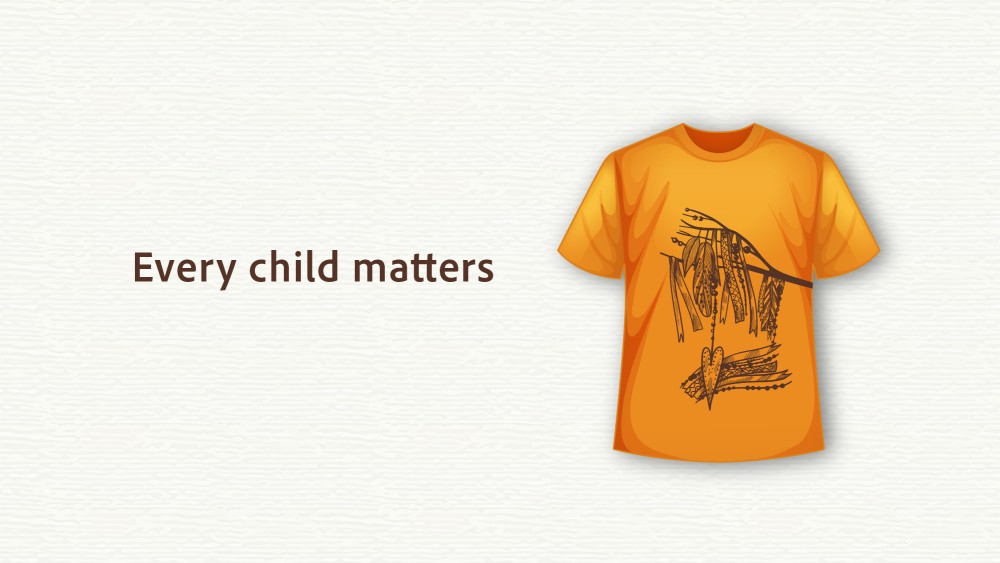The National Day of Truth and Reconciliation: A time to honour the survivors and lost children of Canada’s residential school system
UNA’s position statement supports the Calls to Action of the Truth and Reconciliation Commission of Canada, in particular those that deal with health
On Monday, September 30, United Nurses of Alberta with all Canadians will mark the National Day for Truth and Reconciliation, which honours residential school survivors and the children who never returned home, their families, and their communities.
September 30 is also the 11th annual Orange Shirt Day, during which all Canadians are invited to wear orange shirts to honour survivors and raise awareness of the intergenerational impacts if the residential school system that operated in Canada from before Confederation in 1867 until 1997.
Orange Shirt Day is an Indigenous-led commemorative day honouring the children who survived residential schools and remembering those who did not. This day relates to the experience of Phyllis Webstad on her first day of school, where she arrived dressed in a new orange shirt, which was taken from her. The orange shirt has become a symbol of the stripping away of culture, freedom and self-esteem experienced by Indigenous children over generations.
In 2021, Parliament declared the National Day for Truth and Reconciliation to be a federal statutory holiday for federal workers and workers in federally regulated workplaces. The day is a statutory holiday for all workers in British Columbia, the Northwest Territories, Prince Edward Island, and Yukon.
While the National Day for Truth and Reconciliation is not listed in Article 18 of UNA’s Provincial Collective Agreement, and despite UNA’s efforts to have it listed, it is recognized as a Named Holiday.
UNA is committed to reconciliation with Indigenous peoples in Canada
UNA is committed to reconciliation with Indigenous peoples in Canada and acknowledges that it requires real action on the part of our union and all Canadians, in addition to symbolic activities such as land acknowledgements.
UNA’s Executive Board endorsed a position statement on Indigenous Health and the Truth and Reconciliation Commission, which committed to UNA recognizing the historical fact that Canada’s colonial mission was predicated upon the cultural genocide of Indigenous people.
In particular, UNA’s position statement supports the Calls to Action of the Truth and Reconciliation Commission of Canada (2007-2015), in particular Calls to Action 18-24, which deal with health.
Calls to Action 18-24
Health
18. We call upon the federal, provincial, territorial, and Aboriginal governments to acknowledge that the current state of Aboriginal health in Canada is a direct result of previous Canadian government policies, including residential schools, and to recognize and implement the health-care rights of Aboriginal people as identified in international law, constitutional law, and under the Treaties.
19. We call upon the federal government, in consultation with Aboriginal peoples, to establish measurable goals to identify and close the gaps in health outcomes between Aboriginal and non-Aboriginal communities, and to publish annual progress reports and assess long-term trends. Such efforts would focus on indicators such as: infant mortality, maternal health, suicide, mental health, addictions, life expectancy, birth rates, infant and child health issues, chronic diseases, illness and injury incidence, and the availability of appropriate health services.
20. In order to address the jurisdictional disputes concerning Aboriginal people who do not reside on reserves, we call upon the federal government to recognize, respect, and address the distinct health needs of the Métis, Inuit, and off-reserve Aboriginal peoples.
21. We call upon the federal government to provide sustainable funding for existing and new Aboriginal healing centres to address the physical, mental, emotional, and spiritual harms caused by residential schools, and to ensure that the funding of healing centres in Nunavut and the Northwest Territories is a priority.
22. We call upon those who can effect change within the Canadian health-care system to recognize the value of Aboriginal healing practices and use them in the treatment of Aboriginal patients in collaboration with Aboriginal healers and Elders where requested by Aboriginal patients.
23. We call upon all levels of government to:
i. Increase the number of Aboriginal professionals working in the health-care field.
ii. Ensure the retention of Aboriginal health-care providers in Aboriginal communities.
iii Provide cultural competency training for all health-care professionals.
24. We call upon medical and nursing schools in Canada to require all students to take a course dealing with Aboriginal health issues, including the history and legacy of residential schools, the United Nations Declaration on the Rights of Indigenous Peoples, Treaties and Aboriginal rights, and Indigenous teachings and practices. This will require skills-based training in intercultural competency, conflict resolution, human rights, and anti-racism.

